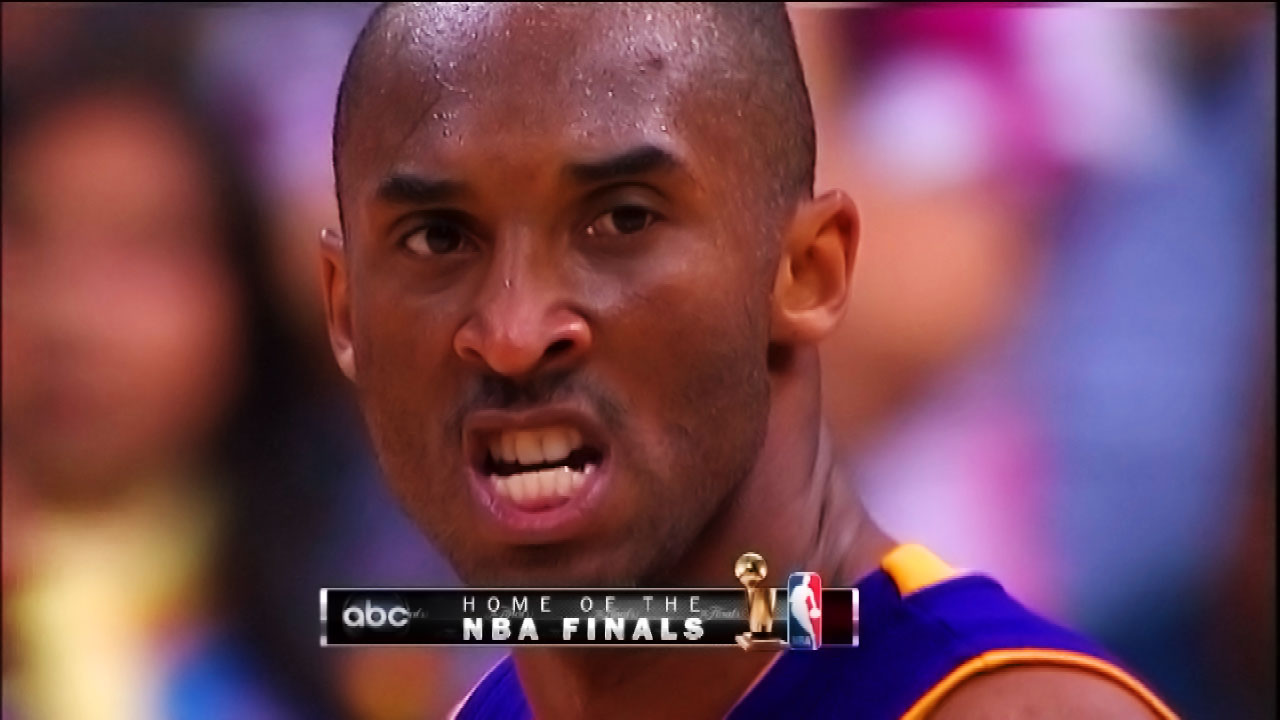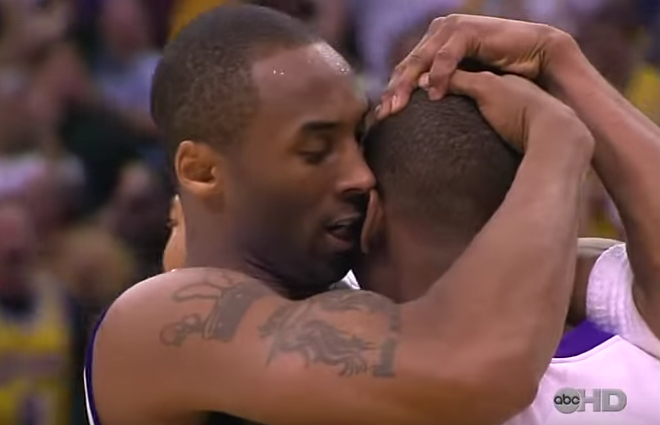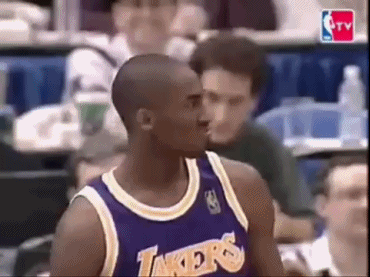I was nine years old when I decided I hated Kobe Bryant.
That’s a really young age to have fully-developed hatred in your heart for a man you’ve never met. At nine, you’re taking standardized tests, kissing girls and running, and promising your mom your teacher is lying—you didn’t mumble that curse word under your breath after she announced a pop quiz.
Still, at nine years old, I knew I hated Kobe Bean Bryant. I hated everything about him. That stupid Afro. The faux-surprised face he made when a lane opened up for him late in a game, allowing him to drive to the rim and posterize a player I actually liked. The awkward way he stuck his leg out when he shot a three-pointer. That ugly thing he did with his face when he was in the zone and wanted everyone to know: he’d scrunch his eyebrows together in an audacious glare, then bare his bottom teeth so obnoxiously his jaw protruded from his face as if he were an agitated orangutan.  Who did this guy think he was, Jordan? That’s exactly who he thought he was. Jordan reincarnated, with better (stupider) hair and a mustard yellow jersey. What’s worse? He had the guy that orchestrated Jordan’s championships, Phil Jackson, at his side. From 2001 to 2010, they would wreak havoc together on every team I took a liking to.
Who did this guy think he was, Jordan? That’s exactly who he thought he was. Jordan reincarnated, with better (stupider) hair and a mustard yellow jersey. What’s worse? He had the guy that orchestrated Jordan’s championships, Phil Jackson, at his side. From 2001 to 2010, they would wreak havoc together on every team I took a liking to.
First, it was Allen Iverson and the 76ers. In 2001, a cast of scrappy wing players followed their star guard Iverson all the way to the NBA Finals, and a Game 1 victory that birthed one of the greatest step-back moments in league history. Iverson over Lue, nothing but net. Game, set, match. The step-over, the sleeve, the cornrows. It was a moment so transcendental and immediately scathing to Lue’s reputation, that if you ask him about it today his face melts and his lips purse as if he’d been caught cheating by his wife. En route to that moment, A.I. was ridiculous. 50-point games, circus shots, come-from-behind victories. Ask a basketball fan to name five players from that 2000-2001 team. Shoot, ask a 76ers fan. They probably can’t. It was the A.I. show. He’d given them seemingly irreversible momentum; they had a darn good coach, and he was the MVP of the league. Kobe didn’t stand a chance.
The 76ers didn’t win another game in the 2001 NBA Finals. Ring number two for Bryant.
As a young kid, I rarely had a true favorite team. The Knicks were a terribly run organization, and I couldn’t force a true emotional allegiance to them. I had favorite players like A.I., Stephon Marbury, Latrell Sprewell and Ray Allen, but that was only good for picking squads on NBA Street. The 2003 Draft brought in a few guys I’d routinely root for because I watched them play in their college days, but it wasn’t until 2007 I’d permanently commit to one team: the Sonics, now the Thunder. For much of my young life, especially after 2001, my criterion for supporting a team was pretty simple: whichever team had the best chance to bring down Kobe Bryant.
The next year, that was the Sacramento Kings. The Sac-town band of brothers was a scrappy bunch, much like the 76ers. They really had just one prolific two-way player, Chris Webber, but they had some of the best B-grade players in the game: Doug Christie, one of the best perimeter defenders of the 2000’s, Bobby Jackson with those high socks and that headband, Mike Bibby, who sometimes played like a Top 15 point guard, and a lights-out long-range shooter in Peja Stojakovic. Most importantly, they were rigid defensively and had the size to guard Shaq. Through three games the Kings had a comfortable 2-1 lead in the 2002 Western Conference Finals, and in Game 4, they had the Lakers on the ropes. Sacramento was one defensive stop from taking a commanding 3-1 lead in the series and pushing LA, most importantly Kobe, to the brink of elimination. Bryant tried to be the hero and threw up a brick. Robert Horry, as he’d done to so many teams before, hovered behind the 3-point line, waited for the rebound to come his way, and put up a gorgeous, high-arching shot at the buzzer, despite Chris Webber’s desperately outstretched hand.
The Lakers won that game, and two of the next three. They swept the Nets in the NBA Finals. Ring number three for Kobe Bryant.
When Kobe won that third ring, I remember the look on his face as he and his teammates exchanged high-fives and hugs. A “2002 NBA Champions” hat was perched atop his afro as he ran up to Rick Fox, Derek Fisher and Brian Shaw—his stout supporting cast—but  what I remember most was his exchange with Phil Jackson. That’s what angered me. See, the Nets weren’t just a team that I hoped could beat Kobe Bryant. Due to my inability to invest emotionally with the Knicks, I did the next best thing, and slowly became an actual fan of the Nets. I had a navy blue Jason Kidd jersey; Keith Van Horn and Kerry Kittles were the background on the desktop computer at home. I jubilantly shouted “grey streak” at the TV when back-up guard Lucious Harris would get hot from deep. I cherished my copy of Kenyon Martin’s “Bad Ass Yellow Boy” Sports Illustrated cover (and got in trouble at school for calling it that). My dad took me to my fair share of Nets games too. They had personality, talent, a Black coach, and were close enough to be thought of as a home team. Still, after several Herculean efforts in those Finals, the Nets couldn’t muster a single victory against a refined, two-time defending champion Laker team. That exchange with Phil Jackson was the type of exchange an NFL holder has with the kicker after a made extra point. It was celebratory, yes, but subtle. An after-thought. It looked as if they were happy they didn’t have to play a Game 5 because they’d made plans to go to the movies. Yeah, ring number three, in a row. Whatever.
what I remember most was his exchange with Phil Jackson. That’s what angered me. See, the Nets weren’t just a team that I hoped could beat Kobe Bryant. Due to my inability to invest emotionally with the Knicks, I did the next best thing, and slowly became an actual fan of the Nets. I had a navy blue Jason Kidd jersey; Keith Van Horn and Kerry Kittles were the background on the desktop computer at home. I jubilantly shouted “grey streak” at the TV when back-up guard Lucious Harris would get hot from deep. I cherished my copy of Kenyon Martin’s “Bad Ass Yellow Boy” Sports Illustrated cover (and got in trouble at school for calling it that). My dad took me to my fair share of Nets games too. They had personality, talent, a Black coach, and were close enough to be thought of as a home team. Still, after several Herculean efforts in those Finals, the Nets couldn’t muster a single victory against a refined, two-time defending champion Laker team. That exchange with Phil Jackson was the type of exchange an NFL holder has with the kicker after a made extra point. It was celebratory, yes, but subtle. An after-thought. It looked as if they were happy they didn’t have to play a Game 5 because they’d made plans to go to the movies. Yeah, ring number three, in a row. Whatever.
Most people don’t like to be referred to as arrogant. By definition it means you have an inflated sense of self-importance; it means something about you isn’t genuine, and in team sports, that’s the worst thing to be. Kobe Bryant isn’t most people. In a way he made it easy to dislike him. He never looked like anything fazed him. Opponents were inferior to him. Even if they weren’t as good a player as him, he side-eyed them or stared them down as if they were sub-par human beings. Even as he continued to battle on-court and off-court allegations, from his own teammates revealing his selfish nature to the rape allegations heard around the world, Kobe Bryant’s pedestal never collected dust. He was constantly atop it, looking down on the rest of the world, reminding everyone that without him, this whole thing—the NBA, the sports world, ESPN’s ratings—was pointless without him.
In the years following his third ring, I enjoyed watching him struggle in the absence of Shaq, who had finally had enough of Kobe’s sh*t and had relocated to Miami. If you ask him, I’m sure he’ll tell you something to the effect of “to be as good as I am, you have to be arrogant,” but I don’t think that’s true. Stephen Curry is arguably (and somewhat easily) the best shooter the game has ever seen. He’s the reigning NBA champion and MVP. No Kobe Bryant team in two decades ever began a season 19-0, yet Steph Curry doesn’t have the same “only-I-can-breathe-this-air” demeanor about him. He exults jubilantly when a play goes his way, and admits when someone’s gotten the best of him. Kobe Bryant wears his arrogance like Joe Namath wore his furs: obnoxiously, relentlessly, and irrationally. He’s a proud villain, and uses people’s dislike for him as diesel fuel to achieve the very things they strive for. He’s Heath Ledger’s Joker—a ravenous competitor who laughs at the idea of working towards the “greater good.” He is the greater good. Everything else is a distraction.
When he announced on Sunday evening in a Player’s Tribune piece titled “Dear Basketball” that he’d be retiring at the end of the 2015-2016 season, part of me was deeply saddened. Despite his post-Shaq futility, Kobe would return to form in the latter half of the decade and continue to thwart the efforts of players and teams that I rooted for. He did away with Carmelo Anthony, whom I’d rooted for since his college ball days at Syracuse, and the 2008-2009 Nuggets in six games; Ray Allen and the Celtics would feel his wrath the very next year. Those were rings four and five for Kobe Bryant,  but I disliked him less. As I grew older and delved deeper into the world of sports I had conversations with people old enough to remember the Michael Jordan’s and the Hakeem Olajuwon‘s of the world. They referred fondly to that era, when if you busted your face open you put a Band-Aid on it and got back in the game. That gritty, all-for-one, one-for-all attitude that some—certainly Jeff Van Gundy—might argue is missing from today’s version of the sport. In the Lakers’ off years, I watched Kobe trot out with some really bad Laker teams, trying to teach Triangle Offense 103 and Screen-And-Roll 102 to players that hadn’t yet grasped announcer Mark Jackson’s infamous “hand down, man down” concept.
but I disliked him less. As I grew older and delved deeper into the world of sports I had conversations with people old enough to remember the Michael Jordan’s and the Hakeem Olajuwon‘s of the world. They referred fondly to that era, when if you busted your face open you put a Band-Aid on it and got back in the game. That gritty, all-for-one, one-for-all attitude that some—certainly Jeff Van Gundy—might argue is missing from today’s version of the sport. In the Lakers’ off years, I watched Kobe trot out with some really bad Laker teams, trying to teach Triangle Offense 103 and Screen-And-Roll 102 to players that hadn’t yet grasped announcer Mark Jackson’s infamous “hand down, man down” concept.
He never stopped trying though.
In 2006, when Kobe’s Lakers were up against a run-and-gun Phoenix Suns team that outmatched them at nearly every position, Smush Parker, a not-so-good player that lucked into a starting role, made a game-saving steal that eventually led to a Kobe Bryant game-tying circus shot, which about 15 minutes later gave way to a Kobe Bryant buzzer-beating overtime game-winner.
It’s one of the great playoff moments of his career, despite the Suns going on to win the series. After Bryant’s game-tying bucket, with his teammates mobbing him and the Staples Center in a frenzy, the first thing he did was grab Parker by the head, look him straight in the eyes, and scream something into his ear multiple times as they shuffled towards the sideline. An alternate ABC camera angle revealed Bryant’s message: “great play, motherf*cker.”
Parker would later reveal Kobe Bryant treated him with such disdain during his time with the Lakers that Parker wasn’t allowed to talk to Kobe during certain practices due to a lack of “accolades.” It’s not that far-fetched a theory. Kobe once told the Los Angeles Times the only reason Parker was on the team was because the Lakers were “too cheap to pay for a point guard.” But in that moment, Smush Parker knew why Kobe was so hard on him; why Kobe treated him like a mischievous child in practice. Sub-par wasn’t an option, and Parker may not have liked to admit that he knew that was the  reason, but he knew. He still knows to this day.
reason, but he knew. He still knows to this day.
Now Kobe Bryant is sub-par. The man that once averaged 35 points per game in a season is no longer the leading scorer on the Lakers. He fumbles the ball several times a game and often looks as if his legs are uncooperative. He screams at his teammates in practice for making poor decisions but he makes anywhere from three to eight of them on a given night. The Lakers aren’t one of the worst teams in the league in spite of Kobe Bryant, they’re one of the worst teams in the league because of Kobe Bryant. For the first time in two decades, the Lakers are experiencing diminishing returns with their tenured superstar, and he’s decided to hang it up.
In April, gone will be the man that spent his entire career with the same team through thick and thin, playing the sport he loved until his final athletic breath. He didn’t leave Los Angeles for a Big Three or to team up with someone that could put him in position to achieve that elusive sixth ring. When he was down, he stayed down until he came up, and when he was up, he never stopped believing that he could one day reach the pinnacle again. There’s a fight in Kobe Bryant that isn’t in any other player in the NBA. One could argue Tim Duncan, but Duncan never had to have quite the fight Kobe Bryant has. Bad Spurs teams maybe lost in the first round of the playoffs. Bad Lakers teams earned lottery picks. The way Bryant talks about the game of basketball makes you want to excel in every other area of your life. In a documentary special that aired on ESPN in 2009, Kobe Doin’ Work, he discusses a player setting a screen as if it were a soldier sneaking a grenade past enemy lines. The game is a poem to Kobe, and now that he can’t recite its lines, a black cloud will momentarily hover over the game. As miserable as he made my basketball fan experience for much of my life, there will never be another Kobe Bryant. I’ll miss what he represents, if not his play.
As I’m writing this, Kobe and his Lakers are in Philadelphia—his hometown—to play the 0-18 76ers, who are trying to avoid the worst start to a season in NBA history. They eventually do, defeating the Lakers by 12 points, and in the process add another unfortunate highlight to Kobe’s final reel. At the game’s onset however, Kobe looked as if his number were 8 again. He quickly had nine points on consecutive three-pointers, and it looked as if the weight of the moment had temporarily rejuvenated him. While all this is happening, a co-worker of mine balls up a piece of paper, swivels around in his chair, leans back, fakes out an imaginary defender, sticks his tongue out and yells “Kobe” as he shoots it at the trash can. There’s no other basketball player whose name would’ve sounded appropriate as an exclamation in this instance. “Jordan!” “Bird!” “LeBron!” Nope. None work. An adjacent computer screen blocks my view of the garbage can, so I couldn’t see whether or not the shot had gone in. To be quite honest, it didn’t matter.


